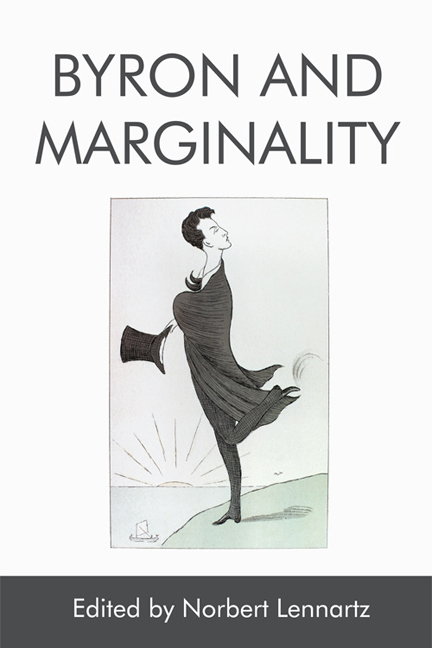Book contents
- Frontmatter
- Contents
- Foreword
- Acknowledgements
- Editions and Abbreviations
- 1 Lord Byron, Wandering and Wavering between the Centres and Margins of Romanticism: An Attempt at an Introduction
- I Byron’s Marginalisation in Romantic World Literature
- II Byron’s Marginal Identities and Places
- III Cherishing the Marginal – Marginal Genres in Byron
- IV On the Provocative Margins of Taste
- V Marginal Affairs – Visual and Paratextual Aspects in Byron
- List of Contributors
- Index
2 - Byron and Weltliteratur
Published online by Cambridge University Press: 06 May 2021
- Frontmatter
- Contents
- Foreword
- Acknowledgements
- Editions and Abbreviations
- 1 Lord Byron, Wandering and Wavering between the Centres and Margins of Romanticism: An Attempt at an Introduction
- I Byron’s Marginalisation in Romantic World Literature
- II Byron’s Marginal Identities and Places
- III Cherishing the Marginal – Marginal Genres in Byron
- IV On the Provocative Margins of Taste
- V Marginal Affairs – Visual and Paratextual Aspects in Byron
- List of Contributors
- Index
Summary
If Byron spent much of his life at the geographical margins of the European continent – childhood in Aberdeen, travels in the Spanish Peninsula and the Levant, residence in Venice and the coastal cities of Ravenna, Pisa and Genoa, in voluntary exile from England after 1816 – he none the less occupied a central position in the consciousness of post-Napoleonic Europe. It was the notoriety of his separation from Annabella Milbanke that first brought Byron to Goethe's attention in 1816, and the eminence of his writings and personality that sustained the older poet's interest in him. In late October 1823 – by which time he had read The Corsair (1814), Lara (1814), The Siege of Corinth (1816), Parisina (1816), The Prisoner of Chillon (1816), Manfred (1817), at least the first two cantos of Don Juan (1819), English Bards and Scotch Reviewers (1809), Marino Faliero (1821), Sardanapalus (1821), Cain (1821) and The Island (1823) – Goethe recommended Byron to Johann Peter Eckermann, the Boswell of Weimar, as the most compelling reason to learn English. Although by no means uncritical of Byron, whose apparent misanthropy and licentiousness he regretted, the ennobled privy councillor recognised in the noble lord a profoundly original and spirited writer whom, alone among contemporaries, he thought worthy of comparison with himself: ‘Byron allein lasse ich neben mir gelten,’ he affirmed to Friedrich von Müller in 1823.
Neglecting Childe Harold's Pilgrimage (1812–18) and possibly much of Don Juan while overrating the dramas, Goethe's reception of Byron may well seem eccentric, as Eliza Marian Butler concluded in her study of their relationship. Certainly, the writings he praised, particularly the historical dramas, are not the ones on which Byron's reputation now principally rests; but the dramas, like the Eastern tales, do represent the fullness and complexity of human existence through the viewpoints of individuals in conflict with dominant institutions and customs. Fritz Strich's thesis is that Goethe loved Byron like a spiritual son, in whom he recognised the agonies, the errors, the brilliance and the demonic energy of his own youth. It is true that, rather like a proud father, Goethe kept a portfolio in which he preserved documents relating to Byron.
- Type
- Chapter
- Information
- Byron and Marginality , pp. 19 - 39Publisher: Edinburgh University PressPrint publication year: 2018

